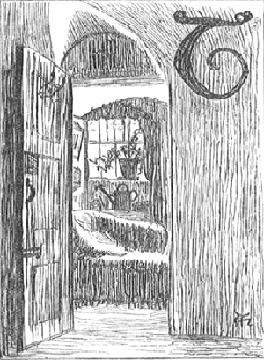Tom Brown's Last Match
“Heaven grant the manlier heart, that timely, ere Youth fly, with life’s real tempest would be coping; The fruit of dreamy hoping Is, waking, blank despair.”
—Clough, Ambarvalia.

The Tenantless Study
The curtain now rises upon the last act of our little drama—for hard-hearted publishers warn me that a single volume must of necessity have an end. Well, well! the pleasantest things must come to an end. I little thought last long vacation, when I began these pages to help while away some spare time at a watering-place, how vividly many an old scene which had lain hid away for years in some dusty old corner of my brain, would come back again, and stand before me as clear and bright as if it had happened yesterday. The book has been a most grateful task to me, and I only hope that all you, my dear young friends who read it (friends assuredly you must be, if you get as far as this), will be half as sorry to come to the last stage as I am.
Not but what there has been a solemn and a sad side to it. As the old scenes became living, and the actors in them became living too, many a grave in the Crimea and distant India, as well as in the quiet churchyards of our dear old country, seemed to open and send forth their dead, and their voices and looks and ways were again in one’s ears and eyes, as in the old School-days. But this was not sad; how should it be, if we believe as our Lord has taught us? How should it be, when one more turn of the wheel, and we shall be by their sides again, learning from them again, perhaps, as we did when we were new boys.
Then there were others of the old faces so dear to us once, who had somehow or another just gone clean out of sight—are they dead or living? We know not, but the thought of them brings no sadness with it. Wherever they are, we can well believe they are doing God’s work and getting His wages.
But are there not some, whom we still see sometimes in the streets, whose haunts and homes we know, whom we could probably find almost any day in the week if we were set to do it, yet from whom we are really farther than we are from the dead, and from those who have gone out of our ken? Yes, there are and must be such; and therein lies the sadness of old School memories. Yet of these our old comrades, from whom more than time and space separate us, there are some, by whose sides we can feel sure that we shall stand again when time shall be no more. We may think of one another now as dangerous fanatics or narrow bigots, with whom no truce is possible, from whom we shall only sever more and more to the end of our lives, whom it would be our respective duties to imprison or hang, if we had the power. We must go our way, and they theirs, as long as flesh and spirit hold together: but let our own Rugby poet speak words of healing for this trial:—
“To veer how vain! on, onward strain, Brave barks! in light, in darkness too; Through winds and tides one compass guides,— To that, and your own selves, be true.
“But, O blithe breeze! and O great seas, Though ne’er that earliest parting past, On your wide plain they join again, Together lead them home at last.
“One port, methought, alike they sought, One purpose hold where’er they fare. O bounding breeze, O rushing seas! At last, at last, unite them there!”1
This is not mere longing, it is prophecy. So over these too, our old friends, who are friends no more, we sorrow not as men without hope. It is only for those who seem to us to have lost compass and purpose, and to be driven helplessly on rocks and quicksands; whose lives are spent in the service of the world, the flesh, and the devil; for self alone, and not for their fellow-men, their country, or their God, that we must mourn and pray without sure hope and without light; trusting only that He, in whose hands they as well as we are, who has died for them as well as for us, who sees all His creatures
“With larger other eyes than ours, To make allowance for us all,”
will, in His own way and at His own time, lead them also home.
Another two years have passed, and it is again the end of the summer half-year at Rugby; in fact, the School has broken up. The fifth-form examinations were over last week, and upon them have followed
| Previous chapter | Back | Home | Email this | Search | Discuss | Bookmark | Next chapter/page |